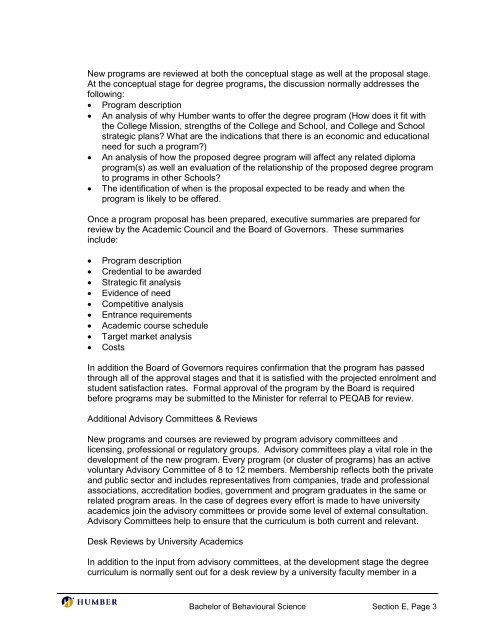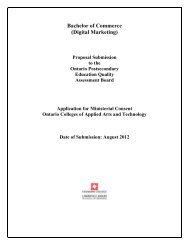Bachelor of Behavioural Science - Postsecondary Education Quality ...
Bachelor of Behavioural Science - Postsecondary Education Quality ...
Bachelor of Behavioural Science - Postsecondary Education Quality ...
Create successful ePaper yourself
Turn your PDF publications into a flip-book with our unique Google optimized e-Paper software.
New programs are reviewed at both the conceptual stage as well at the proposal stage.<br />
At the conceptual stage for degree programs, the discussion normally addresses the<br />
following:<br />
<br />
<br />
<br />
<br />
Program description<br />
An analysis <strong>of</strong> why Humber wants to <strong>of</strong>fer the degree program (How does it fit with<br />
the College Mission, strengths <strong>of</strong> the College and School, and College and School<br />
strategic plans What are the indications that there is an economic and educational<br />
need for such a program)<br />
An analysis <strong>of</strong> how the proposed degree program will affect any related diploma<br />
program(s) as well an evaluation <strong>of</strong> the relationship <strong>of</strong> the proposed degree program<br />
to programs in other Schools<br />
The identification <strong>of</strong> when is the proposal expected to be ready and when the<br />
program is likely to be <strong>of</strong>fered.<br />
Once a program proposal has been prepared, executive summaries are prepared for<br />
review by the Academic Council and the Board <strong>of</strong> Governors. These summaries<br />
include:<br />
<br />
<br />
<br />
<br />
<br />
<br />
<br />
<br />
<br />
Program description<br />
Credential to be awarded<br />
Strategic fit analysis<br />
Evidence <strong>of</strong> need<br />
Competitive analysis<br />
Entrance requirements<br />
Academic course schedule<br />
Target market analysis<br />
Costs<br />
In addition the Board <strong>of</strong> Governors requires confirmation that the program has passed<br />
through all <strong>of</strong> the approval stages and that it is satisfied with the projected enrolment and<br />
student satisfaction rates. Formal approval <strong>of</strong> the program by the Board is required<br />
before programs may be submitted to the Minister for referral to PEQAB for review.<br />
Additional Advisory Committees & Reviews<br />
New programs and courses are reviewed by program advisory committees and<br />
licensing, pr<strong>of</strong>essional or regulatory groups. Advisory committees play a vital role in the<br />
development <strong>of</strong> the new program. Every program (or cluster <strong>of</strong> programs) has an active<br />
voluntary Advisory Committee <strong>of</strong> 8 to 12 members. Membership reflects both the private<br />
and public sector and includes representatives from companies, trade and pr<strong>of</strong>essional<br />
associations, accreditation bodies, government and program graduates in the same or<br />
related program areas. In the case <strong>of</strong> degrees every effort is made to have university<br />
academics join the advisory committees or provide some level <strong>of</strong> external consultation.<br />
Advisory Committees help to ensure that the curriculum is both current and relevant.<br />
Desk Reviews by University Academics<br />
In addition to the input from advisory committees, at the development stage the degree<br />
curriculum is normally sent out for a desk review by a university faculty member in a<br />
<strong>Bachelor</strong> <strong>of</strong> <strong>Behavioural</strong> <strong>Science</strong> Section E, Page 3
















